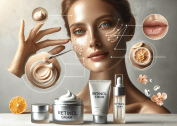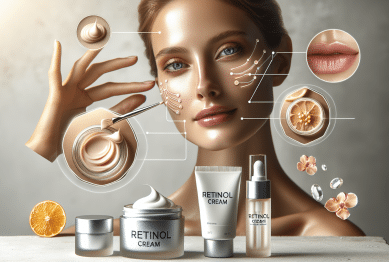Discover the holistic path to glowing skin using proven wellness and beauty routines. This guide reveals how skincare, nutrition, lifestyle, and self-care blend together for lasting radiance. Start learning about expert-backed tips and step into a world where skin health becomes a positive, joyful ritual.
The Foundations of Healthy, Glowing Skin
Healthy skin is the result of a thoughtful blend of practices and habits. Consistent routines, mindful nutrition, and the right products all play a role in maintaining a luminous complexion. It’s not about magic potions or quick fixes but about understanding the real science behind daily skincare. When basic needs like cleansing, protecting, and moisturizing are met, skin naturally reflects wellness from inside out. Adopting such a routine can help reinforce the skin’s barrier and prevent issues before they occur.
Environmental factors add complexity to skincare choices. Urban pollutants, UV exposure, and seasonal changes can stress the skin, resulting in dryness or irritation. A basic routine starts with gentle cleansing to remove impurities, followed by hydration with a quality moisturizer suitable for unique skin types. Finally, broad-spectrum sunscreen shields against UV damage, which is a leading cause of premature aging. This three-step system anchors any skincare plan and supports ongoing skin wellness.
Hydration is key to the skin’s glow. Daily water consumption, balanced with nutrient-rich foods, provides the foundation for resilience and radiance. Avoiding harsh soaps or over-exfoliating helps maintain the skin’s pH balance. Through mindful decisions and simple steps, skin develops a natural, healthy sheen. Over time, these habits foster confidence and comfort, allowing the skin’s unique beauty to shine through. For many, returning to these basics delivers a noticeable difference in tone and texture.
The Role of Nutrition in Achieving Luminous Skin
Nutrition is often considered the unsung hero of radiant skin. Foods packed with antioxidants, vitamins, and healthy fats help fortify the skin from within. Leafy greens, berries, fatty fish, and nuts supply essential nutrients like vitamin C, E, and omega-3 fatty acids. These elements contribute to hydration, repair, and protection against environmental stressors. Many nutritionists point to the Mediterranean diet for its positive impact on skin health, highlighting the link between diet and appearance (Source: https://www.hsph.harvard.edu/nutritionsource/healthy-eating-plate/).
Limiting processed foods and refined sugars is equally important for those seeking to achieve a beautiful complexion. High-glycemic foods and sugary snacks can lead to breakouts and dullness. Replacing these with whole grains and fiber-rich vegetables helps moderate glucose spikes and reduces skin inflammation. Staying informed about food choices empowers individuals to select options that support not just beauty but overall wellness. Over weeks, these subtle shifts enhance vitality and skin clarity.
Hydration goes beyond skincare products—water and herbal teas are essential for maintaining elasticity and plumpness. Hydrated skin is more resistant to irritation and heals faster when faced with sun exposure or environmental stress. For those with specific concerns like acne or redness, nutrition may serve as a subtle, yet powerful, form of support. Viewing skincare and nutrition as a dynamic duo can foster long-term benefits that are visible, tangible, and sustainable.
Effective Skin Care Routines for Every Lifestyle
Finding a skincare routine that fits individual lifestyles often means experimenting with routines and products. Busy schedules sometimes demand the simplicity of a cleanser, serum, and sunscreen. At other times, more elaborate rituals involving exfoliation, masks, and targeted serums may be practical. Key is personalization—matching the skincare approach with personal schedules and unique skin characteristics leads to regular, enjoyable self-care rather than another daily chore.
Modern innovations include products featuring hyaluronic acid, retinol, peptides, and botanical extracts. These ingredients target fine lines, uneven tone, and a lack of firmness, offering noticeable improvements over time. However, overuse or layering too many active ingredients can sometimes create sensitivity or breakouts. Understanding skin’s signals and introducing new products slowly helps minimize adverse reactions and sets the stage for positive changes. A gradual approach also makes it easier to identify which items deliver the greatest benefit. (Source: https://www.aad.org/public/everyday-care/skin-care-basics/care/skin-care-routine)
The nighttime routine is often described as a renewal phase for skin. While a gentle cleanser removes the day’s grime, using antioxidant serums or night creams accelerates the natural repair mechanisms that occur during sleep. Adopting a simple yet mindful ritual at bedtime helps build a positive relationship with self-care and reduces stress, both of which are closely linked to skin health. A streamlined evening process increases consistency—ultimately leading to lasting results.
Balancing Stress and Beauty for Long-Term Benefits
Chronic stress is a key disruptor of healthy skin. Elevated cortisol levels can trigger inflammation, making conditions like acne, eczema, or psoriasis more likely. Stress reduction techniques—mindfulness, meditation, regular movement—help keep hormone levels stable. Practicing mindfulness in daily rituals doubles as self-care and supports emotional balance, which reflects as calm, clear skin. Over time, a commitment to stress management is mirrored in overall appearance and skin resilience (Source: https://www.nimh.nih.gov/health/publications/stress/index.shtml).
Sleep plays a crucial role in promoting radiance. During deep sleep, the body repairs and regenerates cells, including those that make up the skin barrier. Inconsistent sleep or poor quality rest often leads to dullness, puffiness, and fine lines. Establishing bedtime routines—such as gentle stretching, guided relaxation, or turning off screens an hour earlier—can greatly improve sleep quality, thereby enhancing the natural beauty that emerges after a night of rest.
Community and social connection also influence wellness, including the glow of healthy skin. Positive relationships help buffer the effects of stress and provide emotional nourishment. Engaging in social activities, group fitness, or volunteer efforts has a measurable impact on mental health and, by extension, skin health. By focusing on both inner and outer care, individuals can unlock sustainable, multidimensional benefits.
The Science Behind Skincare Ingredients
Choosing skincare ingredients wisely can lead to better, safer results. Ingredients like retinol, niacinamide, and vitamin C are supported by clinical studies for their effects on wrinkles, dark spots, and elasticity. For instance, topical vitamin C acts as a potent antioxidant, neutralizing free radicals and supporting collagen production, essential for smooth, firm skin. Understanding ingredient function helps avoid marketing hype and focus on proven solutions. (Source: https://www.ncbi.nlm.nih.gov/pmc/articles/PMC3673383/)
Many individuals experience sensitivity at some point. Ingredients such as ceramides and squalane mimic the skin’s natural moisturizing factors and are less likely to cause irritation. Avoiding allergens and harsh fragrances, and always using sun protection, minimizes the risk of inflammation. Patch-tests are recommended for new products—especially for those with sensitive or reactive skin—to prevent unwanted reactions and maximize benefits from active ingredients.
Sustainable and clean beauty products attract growing interest for their focus on safety and environmental impact. Brands are now offering plant-based formulations free from synthetic dyes or unnecessary additives. Many turn to cruelty-free and eco-conscious options that align with both personal values and health needs. Exploring ingredient lists and learning how actives interact ensures a tailored, informed approach to daily skincare routines and wider wellness goals.
Embracing Self-Care Rituals for Lasting Glow
Self-care extends far beyond product choices. Mindful rituals—like gentle facial massage, aromatherapy, or time spent in nature—nourish both spirit and skin. These moments create space to reconnect with oneself and foster a sense of joy and well-being. For some, dedicating even five minutes to morning or evening reflection can spark positive emotions that last throughout the day, lifting mood and, by extension, appearance.
Movement is another key aspect of radiant beauty. Activities such as yoga, dance, or brisk walks stimulate blood flow, ensuring skin receives vital oxygen and nutrients. Regular exercise also supports hormone balance and stress reduction, both major contributors to improved skin health (Source: https://www.cdc.gov/physicalactivity/basics/index.htm). Finding activities that are enjoyable increases the likelihood of sustaining these healthy habits over time.
Digital wellness, including setting boundaries for screen time and incorporating tech-free intervals, supports focus, tranquility, and restful sleep. Turning off notifications and creating device-free zones can help minimize overstimulation and restore a sense of calm. When combined with movement, mindfulness, and skin-friendly nutrition, these practices foster true beauty—both seen and felt throughout one’s daily life.
References
1. Harvard T.H. Chan School of Public Health. Healthy Eating Plate & Pyramid. Retrieved from https://www.hsph.harvard.edu/nutritionsource/healthy-eating-plate/
2. American Academy of Dermatology Association. Skin care routine. Retrieved from https://www.aad.org/public/everyday-care/skin-care-basics/care/skin-care-routine
3. National Institute of Mental Health. 5 Things You Should Know About Stress. Retrieved from https://www.nimh.nih.gov/health/publications/stress/index.shtml
4. Pullar, J. M., Carr, A. C., & Vissers, M. (2017). The roles of vitamin C in skin health. Nutrients. Retrieved from https://www.ncbi.nlm.nih.gov/pmc/articles/PMC5579659/
5. National Center for Biotechnology Information. Cosmeceuticals and active ingredients: Antioxidants. Retrieved from https://www.ncbi.nlm.nih.gov/pmc/articles/PMC3673383/
6. Centers for Disease Control and Prevention. Benefits of physical activity. Retrieved from https://www.cdc.gov/physicalactivity/basics/index.htm









